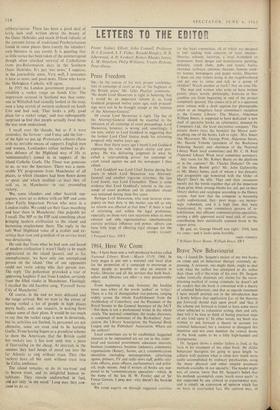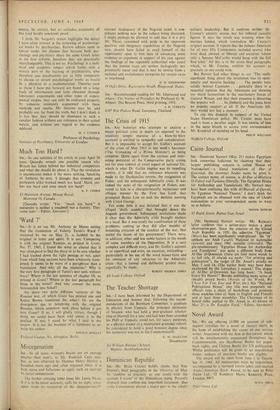Brave New Behaviourist
Sus;---I found Dr. Sargant's review of my two books on crime and on behaviour therapy extremely .dc- pressing. A reviewer, one might think. ought to deal with what the author has attempted to do, rather than chase will-o'-the-wisps of his own. Dr. Sargant rather ironically dismisses any claims for the recon- ditioning method of curing criminals; he doesn't tell his readers that the book is concerned with a theory of criminal behaviour, and that as regards treatment I have myself pointed out in the introduction that 'I firmly believe that application [i.e. of the theories put forward] should wait upon proof' and 'that if the scheme put forward is found to have some merit when subjected to exhaustive testing, then and only then will it be time to think of basing practical steps of any kind upon it.' In other words, my book was written to put forward a theory to account for criminal behaviour; for a reviewer to disregard this intention and not even mention the central theme of the book seems to be a little high-handed and disingen uous.
Dr. Sargant shows a similar failure to look at the facts in his treatment of my other book. He chides behaviour therapists for going to great length 'to achieve with patients what is often now much more easily accomplished by ordinary psychiatrists, using the many physical and other simpler treatment methods available in our specialty.' The reader might not, of course, know that Dr. Sargant's belief-that his methods accomplish cures 'much more easily' is not supported by any clinical or experimental tests. and is simply an expression of opinion which has no basis in ascertained fact. His opinion may, of
course, be correct, but ex cathedra statements of this kind hardly constitute proof.
I think Dr. Sargant's review highlights the defect I have often noticed in the reviewing of psychologi- cal books by psychiatrists. Review editors seem to labour under the illusion that because both psy- chology and psychiatry share the same Greek letter in the first syllable, therefore they are practically interchangeable. This is not so. Psychology is a tech- nical and academic subject which forms only a minute part of the training of psychiatrists, who therefore qua psychiatrists are as little competent to discuss or review psychological works as would be a physicist or a mathematician. Theories such as those I have put forward are based on a large body of information and facts obtained through laboratory experiments and other types of experi- mental studies; they can only be evaluated properly by someone intimately acquainted with these methods and results. My theories may be. and probably are, far from the truth, but I don't think it is fair that they should be dismissed in such a cavalier fashion without any reference to their actual nature, and without any regard to the evidence adduced.
H. 1. EYSENCK
Professor of Psychology institute of Psychiatry, University of London



































 Previous page
Previous page